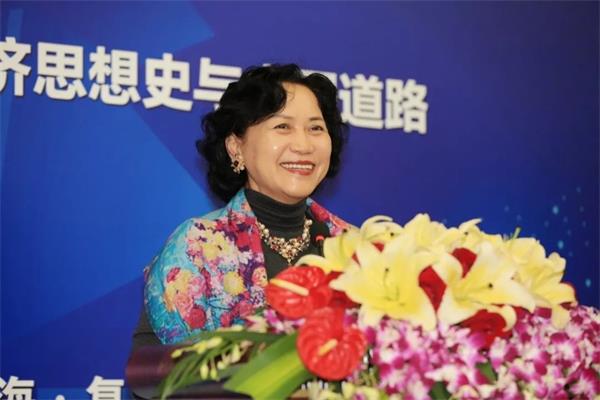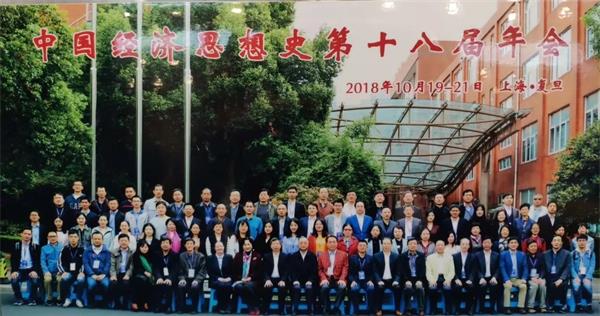From October 19 to 21, 2018, the 18th Annual Meeting of History of Chinese Economic Thought, co-sponsored by the Association of the History of Chinese Economic Thought and Fudan University, organized by the School of Economics of Fudan University and co-organized by Fanhai International School of Finance of Fudan University, was held in Fudan University, Shanghai. The event was attended by nearly 90 scholars from more than 40 colleges and universities and research institutions across China. Prof. Tao Yitao, director of the China Center for Special Economic Zone Research (CCSEZR), Shenzhen University (SZU), a key research base of humanities and social science under the Ministry of Education, dean of the Belt and Road Research Institute of Shenzhen University, dean of the Belt and Road Research Institute (Shenzhen) for International Cooperation and Development (BRRIICD) and vice president of the Association of the History of Chinese Economic Thought, attended the annual meeting and delivered a keynote speech.

Director Tao Yitao, vice president of the Association of the History of Chinese Economic Thought, delivers a keynote speech
Prof. Tao Yitao delivered a keynote speech entitled "Historic Contribution to China's Reform and Opening-up and Successful Experience of Shenzhen Special Economic Zone" in the first part of the morning session. Prof. Tao started her elaboration on China's path with three important historical conferences which cannot be ignored in her opinion when it comes to China's reform and opening-up: the Central Economic Work Conference held from November 10 to December 15, 1978, the 3rd Plenary Session of the 11th Central Committee of the Communist Party of China held from December 18 to 22, 1978 and the Moganshan Conference held in 1984. The first one prepared the reform and opening-up, the second one marked the beginning of the reform and opening-up and the third one officially proposed the reform of the urban economic system and the double-track price system was formed based on the price system reform. Since then, the Chinese society has truly embarked on the path of reform from a traditional planned economy to a socialist market economy.
Prof. Tao Yitao said that China's path is a specific historical concept. It refers to a series of reform and opening-up policies and measures adopted by China and the path of social transformation since 1978. It is a concept relative to the "Washington Consensus". It has the following characteristics: 1. It is about a compulsory government-led top-down institutional change. The central government and local governments are the initiators of the social institutional change. In other words, the government should have a good grasp of the general direction of the reform and opening-up. 2. In terms of path selection, a gradual reform approach is adopted. On one hand, the social reform starts from the economic field and gradually grows to be a thorough reform to establish a government operation mechanism and social management system that is compatible with the socialist market economic system. On the other hand, in the process of reform, the original system remains. The old and new systems have coexisted for quite some time and the transformation from the traditional planned economic system to the socialist market economic system has been completed through constant institutional innovation. The gradual reform aims to reduce the risk of the reform and opening-up. We win people's recognition and support with economic achievements and gradually form the market economy concept and culture that underlies deepened reform. 3. The government plays a key role in the reform and opening-up as well as in deepened reform. For one thing, the process of changing China's social system is to continuously deprive the government of power. Changing the function of the government is an important task for changing of China's social system. For another, the government's vision determines the success or failure of change. We need a government that is open to learning and has the courage to revolutionize itself.
Finally, Prof. Tao Yitao emphasized that as each country has different political, historical and cultural backgrounds, the path of social transformation may be different. The principle is to choose the one that suits you best. The remarkable achievements made by China with 40 years of reform has proved that the path of institutional change chosen by China is successful and correct. The keynote speech delivered by Prof. Tao Yitao was highly recognized by experts and scholars attending the meeting.
The annual meeting themed "History of Chinese Economic Thought and China's Path" includes the Forum for Young and Middle-Aged scholars, Mr. Ye Shichang's Academic Thought Symposium and four concurrent sessions. At the main forum, in addition to Prof. Tao Yitao, Prof. Ma Tao from Fudan University, Prof. Zou Jinwen from Zhongnan University of Economics and Law, also President of Association of the History of Chinese Economic Thought, Professor Cheng Lin from Shanghai University of Finance and Economics, Professor Zhou Jianbo from Peking University, Wei Zhong, vice president and secretary-general of the Association of the History of Chinese Economic Thought and a researcher of Chinese Academy of Social Sciences, Professor Zhao Menghan from Shandong University, Qian Jin, a researcher of Chinese Academy of Social Sciences, and Borokh Olga, an expert of the Institute of Far East Studies of Russian Academy of Sciences, also delivered keynote speeches.

All attendees pose for a group photo
The annual meeting fully reflects the research trends of the history of Chinese economic thought and China's path. While sharing research results, it has inspired scientific research ideas, strengthened exchanges and cooperation in related areas of History of Economic Thoughts and promoted the innovative development of the History of Economic Thoughts.

